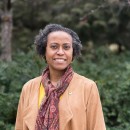Research Office News
Pages
 Shanna Kattari and Leonardo Kattari Receive 2022 SSWR Book Award Honorable Mention
Shanna Kattari and Leonardo Kattari Receive 2022 SSWR Book Award Honorable MentionAssistant Professor Shanna Kattari and Lecturer Leonardo Kattari have won the 2022 SSWR Book Award Honorable Mention for the book they co-edited, “Social Work and Health Care Practice with Transgender and Nonbinary Individuals and Communities: Voices for Equity, Inclusion, and Resilience.” The book includes chapters co-authored by Assistant Professor Ashley Lacombe-Duncan, PhD student Mattthew Bakko, alex kime, MSW ‘18, and Jennifer Schwartz, MSW ‘13. The award was presented on Saturday, January 15, as part of the Society of Social Work and Research Annual Conference.
- January 17, 2022
- Seven Faculty on Stanford University’s 2021 World's Top 2% Scientists List
Seven U-M SSW faculty are included on Stanford University’s 2021 World's Top 2% Scientists list. The database provides standardized information on citations, h-index, co-authorship-adjusted hm-index, citations to papers in different authorship positions, and a composite indicator.
- Linda Chatters
- Lorraine Gutiérrez
- Todd Herrenkohl
- Joseph Ryan
- Robert Taylor
- Richard Tolman
- Bradley Zebrack
- January 12, 2022
- Learn more »
 Brad Zebrack Receives the American Psychosocial Oncology Society’s Ruth McCorkle Excellence in Research Mentorship Award
Brad Zebrack Receives the American Psychosocial Oncology Society’s Ruth McCorkle Excellence in Research Mentorship AwardProfessor Brad Zebrack has received the American Psychosocial Oncology Society’s Ruth McCorkle Excellence in Research Mentorship Award. The award honors those who have demonstrated a longstanding commitment to nurturing intellectual growth, career development, professional guidance and positive role modeling in the field of psychosocial oncology.
- December 17, 2021
 Fernanda Cross Featured on Deutsche Welle (DW)
Fernanda Cross Featured on Deutsche Welle (DW)Assistant Professor Fernanda Cross is featured on Deutsche Welle (DW) website. The article explores her journey to the U.S. and her research at U-M School of Social Work. “It is as an immigrant that Cross finds the necessary empathy for her work. As a researcher, she analyzes precisely the insertion of Latin American immigrants in the United States.”
- December 14, 2021
- Learn more »
 William Elliott Delivers the Alice P. Lin Memorial Lecture
William Elliott Delivers the Alice P. Lin Memorial LectureWilliam Elliott was the keynote for the Alice P. Lin Memorial Lecture at Columbia University. Elliott’s talk, "We Also Have to Give Children Something to Live For: Children's Savings, Student Debt, and Wealth Inequality,” argued that the drive Americans have demonstrated throughout their history comes not just from having enough money to pay their bills each week or enough to live on, but from the promise of a better future and that Children’s Savings Accounts can play a role in realizing that future.
Elliott is a social work professor, director of the Joint PhD program in social work and social science and the founding director of the Center on Assets, Education, and Inclusion.
- November 22, 2021
- Learn more »
 Trina Shanks Named Fellow of the American Academy of Social Work and Social Welfare
Trina Shanks Named Fellow of the American Academy of Social Work and Social WelfareTrina Shanks was named a Fellow of the American Academy of Social Work and Social Welfare. The Academy is an honorific society of distinguished scholars and practitioners dedicated to achieving excellence in the field of social work and social welfare through high-impact work that advances social good. Fellow status is among the highest professional accolades bestowed to social work scholars; Michigan Social Work now has 12 academy members. Shanks is the School of Social Work Community Engagement Director and Harold R. Johnson Collegiate Professor of Social Work.
Register for the 6-7 PM, January 19, 2022
Registrants will receive the Zoom link one week prior to the event.
- November 17, 2021
 Berenice Castillo Successfully Defends Dissertation
Berenice Castillo Successfully Defends DissertationBerenice Castillo, Joint Doctoral Program in Social Work and Psychology, has successfully defended her dissertation entitled "Three Studies Examining Externalizing Behavior and Substance Use Among Diverse Youth." Her committee consisted of Andrew Grogan-Kaylor, and John Schulenberg (co-chairs), Cristina Bares and Matt Diemer.
Castillo will join Florida International University as an assistant professor of social work in January.
- November 11, 2021
 Shanna Kattari and Leonardo Kattari Awarded Sexual Orientation and Gender Identity and Expression Scholarship Award at CSWE
Shanna Kattari and Leonardo Kattari Awarded Sexual Orientation and Gender Identity and Expression Scholarship Award at CSWEAssistant Professor Shanna Kattari and Lecturer Leonardo Kattari were awarded the Sexual Orientation and Gender Identity and Expression Scholarship Award at the Council on Social Work Education annual meeting, as co-authors on the paper “Differential Experiences of Dating Violence and Sexual Violence Among Trans/Gender Diverse Youths.” The award recognizes scholarship that contributes to knowledge about sexual orientation and gender identity and expression; the individual and systemic issues associated with these topics; the development of social work curriculum materials and faculty growth opportunities relevant to sexual orientation and gender identity and expression; and the experiences of individuals who are gay, lesbian, bisexual, transgender and/or two-spirit.
- November 5, 2021
- Learn more »
 Sunggeun (Ethan) Park’s Research Published in the Stanford Social Innovation Review
Sunggeun (Ethan) Park’s Research Published in the Stanford Social Innovation ReviewAssistant Professor Sunggeun (Ethan) Park’s research is cited in the Stanford Social Innovation Review. Park and his co-author’s research shows that when local social service organizations take the lead in making policy decisions, the rates of homelessness decrease. “Collaborative governance can best improve client outcomes when it is truly collaborative and providers are given meaningful ways to engage with and influence the process,” they write.
- October 20, 2021
- Learn more »
- School of Social Work Faculty Part of U-M Latinx Multi-Disciplinary Scholars Group
The U-M Working Group to Advance Social Science Scholarship and Teaching on Latinx Youth and Families — which includes Associate Professor David Córdova, Professor Lorraine Gutiérrez, Associate Professor Robert Ortega and Assistant Professor Fernanda Cross — is featured in Diverse Issues in Higher Education. The group unites faculty and graduate students from across disciplines both in and outside of U-M to discuss research, share advice and form a strong community of Latinx scholars.
- October 18, 2021
- Learn more »